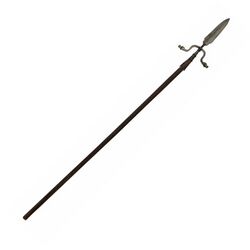Engineering:Linstock

File:Canon firing mvi 3662.ogv A linstock (also called a lintstock) is a staff with a fork at one end to hold a lighted slow match. The name was adapted from the Dutch lontstok, "match stick".[1] Linstocks were used for discharging cannons in the early days of artillery; the linstock allowed the gunner to stand farther from the cannon[2] as it was dangerous applying the lighted match to the touch hole at the breech of the gun: not only could the charge flash back, but the recoil of the cannon might send the carriage toward the gunner.
Design
Linstocks had serpentine[clarification needed] jaws to grip the slow match and a sharp point at the base to stick in the ground.[3] In emergencies gunners could use the spear blade as a weapon to defend the cannon.[4]
Like much early modern military equipment the linstock could have an additional function; 16th century examples had measurements in inches and a protractor engraved on the blade to allow the gun captain to check the angle.[citation needed]
Obsolescence
By the mid-18th century, artillery pieces were being fitted with flintlock firing devices (known as gunlocks), rendering the linstock obsolete[5] though the linstock remained in service in many places where the older form of ignition was used, including the United States during the War of Independence and parts of Europe during the Napoleonic Wars.[6] During the War of 1812 and American Civil War gun crews were issued linstocks,[7] which were used when the flintlock and percussion cap-ignited primers failed.[8]
References
- ↑ "Linstock Definition | Definition of Linstock at Dictionary.com". Dictionary.reference.com. http://dictionary.reference.com/browse/Linstock. Retrieved 2009-11-05.
- ↑ Chisholm, Hugh, ed (1911). "Linstock". Encyclopædia Britannica. 16 (11th ed.). Cambridge University Press. p. 735.
- ↑ Duncan I MacLeod (2003-03-14). "The Artillery Garden". Dimacleod.co.uk. http://www.dimacleod.co.uk/history/ecwshots.htm. Retrieved 2009-11-05.
- ↑ Don Troiani; James L. Kochan; Earl J. Coates; James Kochan (1998). Don Troiani's Soldiers in America, 1754–1865. Stackpole Books. p. 9. ISBN 978-0-8117-0519-6. https://books.google.com/books?id=-X2vvS698p4C&pg=PA9.
- ↑ "linstock: Definition from". Answers.com. http://www.answers.com/topic/linstock. Retrieved 2009-11-05.
- ↑ "An early nineteenth century linstock". Goantiques.com. Archived from the original on 2009-03-03. https://web.archive.org/web/20090303225700/http://www.goantiques.com/detail%2Cearly-nineteenth-century%2C492791.html. Retrieved 2009-11-05.
- ↑ "Articles on Civil War Arms - Civil War Talk.com - Shooting Muzzleloading Artillery Safely". Civil War Talk.com. 2008-01-13. Archived from the original on 2008-12-02. https://web.archive.org/web/20081202111313/http://civilwartalk.com/Resource_Center/Arms_and_Ordnance/Articles_on_Civil_War_Arms/shooting-muzzleloading-artillery-safely-a390.html. Retrieved 2009-11-05.
- ↑ "CWN Artillery Safety". Civilwarnews.com. Archived from the original on 2009-12-12. https://web.archive.org/web/20091212074858/http://www.civilwarnews.com/artillerysafety.htm. Retrieved 2009-11-05.
 |
